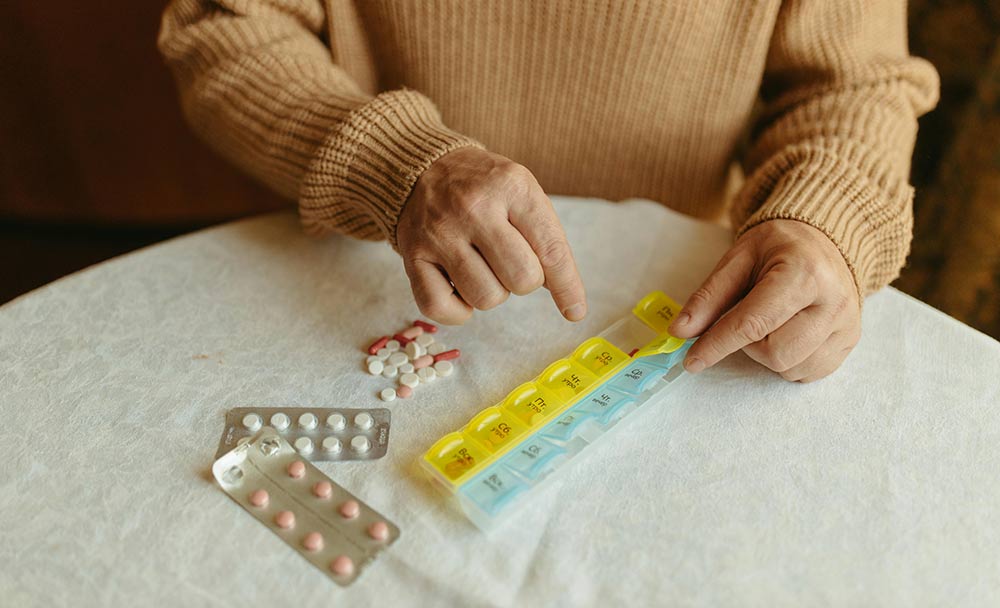Medication Safety at Home: Simple Systems That Work
As a caregiver one of your many responsibilities involves managing the medication of the person you care for. From doctor’s visits and trips to the pharmacy to organizing doses and scheduling, it can sometimes see like an overwhelming task. And no wonder. Older adults are more likely to take multiple prescription medications than any other age group.

The Dangers of Multiple Medications
According to the National Institutes of Health, “[a]dults age 65 and older tend to take more medicines than any other age group because they may have several diseases or other health problems at the same time.” The Centers for Disease Control notes that “[a]mong U.S. adults aged 40–79, 69.0% used one or more prescription drugs in the past 30 days and 22.4% used five or more.”
In part because of the use of multiple prescriptions, older adults also have a higher prevalence of medication self-administration errors (SMEs). In fact, according to a study reviewing SMEs, “The most commonly reported factor contributing to MSEs was complex treatment regimens due to use of multiple medicines.” These errors range from minor to severe and include: “dosing error… missed dose, wrong medicine, incorrect administration methods, wrong administration time and wrong frequency.” Medication arrows can have dangerous consequences in elderly adults, such as increased risk of falls, cognitive issues, drug interactions, organ damage, and even death
Elderly Patients Face Higher Risk
Besides multiple medications, factors that cause the elderly to have more errors regarding their prescriptions “included cognitive decline, decline in physical abilities, lack of social support, lack of knowledge about treatment regimens and negative attitudes and beliefs towards medicines,” according to a 2009 study on the risks of medication errors in the elderly. The study found that in “most cases, MSEs occurred when multiple contributing factors were present.”
The elderly are more prone to these types of errors because of “age-related pharmacological changes, lack of specific evidence on the efficacy and safety of medications, underuse of comprehensive geriatric assessment, less availability of drug formulations offering geriatric doses, and inadequate harmonization of geriatric recommendations,” explains another study on medication problems in older adults.
Prevention is the Best Medicine
While many of those causes are out of your control, the study noted that some causes are preventable: “In older adults, a number of common causes for adverse drug effects, ineffectiveness, or both are preventable.” And that’s where your role as a caregiver comes in. Causes you could help prevent include:
- Drug interactions
- Inadequate monitoring
- Inappropriate medication selection
- Lack of patient adherence
- Overdosage
- Poor communication
So how do you start ensuring the loved one under your care takes medications safely? Medication safety is less about memorizing every pill and more about designing a system that makes the right choice the easy choice. Follow these steps to make sur medications do more help than harm.
Make a list.
Start by building a master medication list that includes each drug’s name (brand and generic), dose, schedule, purpose, prescriber, and start date. Keep a printed copy on the fridge and a photo on your phone. Bring it to every appointment and pharmacy visit.
Containerize the chaos.
Weekly pill organizers are helpful when tablets are safe to handle and split; ask your pharmacist about blister packs or pre-sorted pouches if you prefer less sorting. Place the organizer in a well-lit, consistent location—ideally near a glass of water. Pair doses with a daily anchor (breakfast, local news, evening show) to create a habit loop.
Reduce refill risk.
Refills are where many errors happen. Ask your pharmacy to align refills so most medications renew during the same week. Turn on text alerts or calendar reminders. Keep a small “running low” sticky note on the cabinet; add a hash mark each time you notice only a week’s worth left.
Mind the interactions.
Over-the-counter products and supplements can interfere with prescription drugs. Bring everything—including vitamins, herbal remedies, and occasional pain relievers—to a pharmacist for a medication review at least once a year or after any hospital stay. Pharmacists are a treasure: they can flag duplicates, simplify schedules, and suggest timing tweaks to reduce side effects.
Track what matters.
A tiny notebook (or your phone) can capture side effects and wins: “Dizzy at 10 a.m. after new BP pill,” “Sleep better when evening dose taken by 8.” Patterns inform safer adjustments. If a new symptom appears, note when it started, any recent changes, and what helps.
Store medications safely.
Avoid humidity and heat (so, not the bathroom). Ask about safe disposal; many pharmacies and police stations host take-back programs. For anyone with children or memory concerns, consider lockable boxes.
Finally, communicate.
If a dose is missed, follow your clinician’s guidance—don’t double up unless told to do so. When something feels off, call the pharmacist or clinic; your observations are vital data. Thoughtful systems beat memory every time, and they keep the people you love safer. Are you caring for an elderly friend or loved one at home? Mass Care Link has resources for caregivers to keep them safe and lighten your load.
